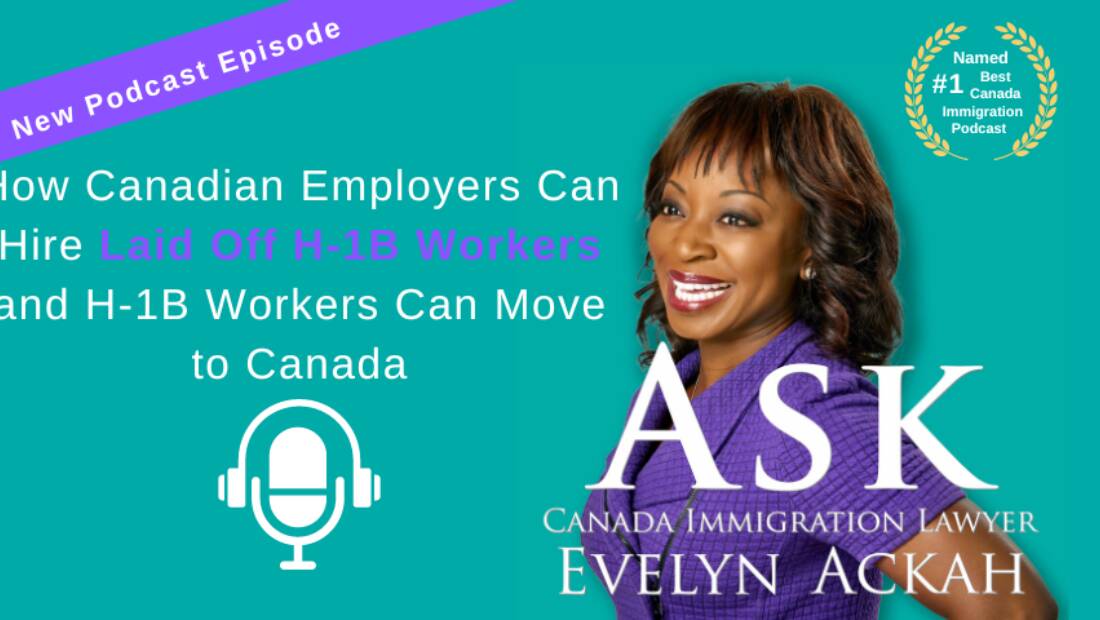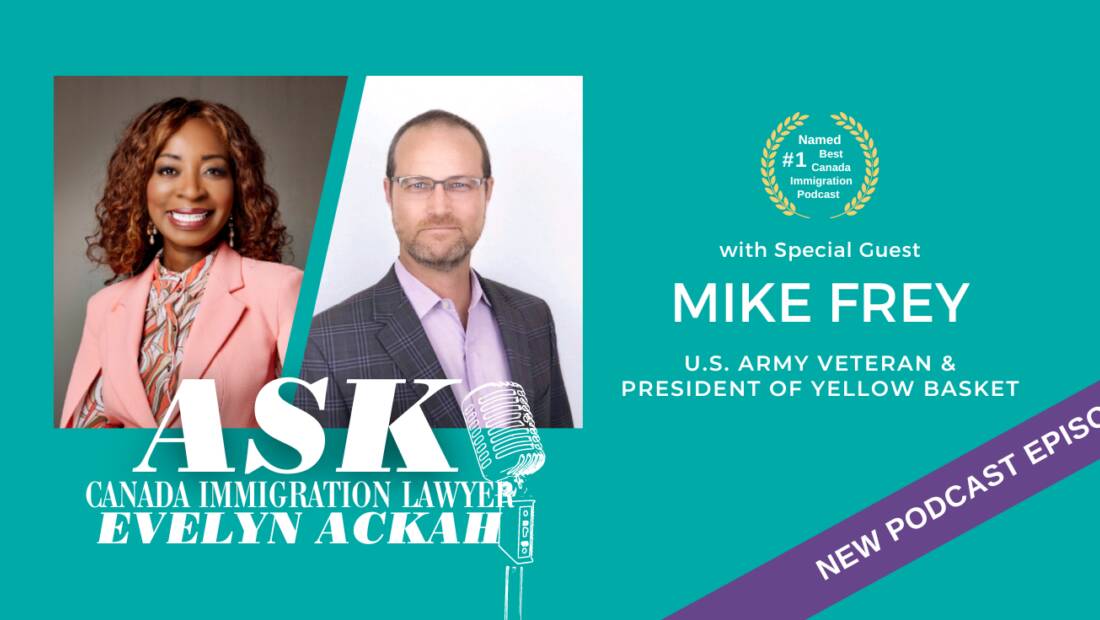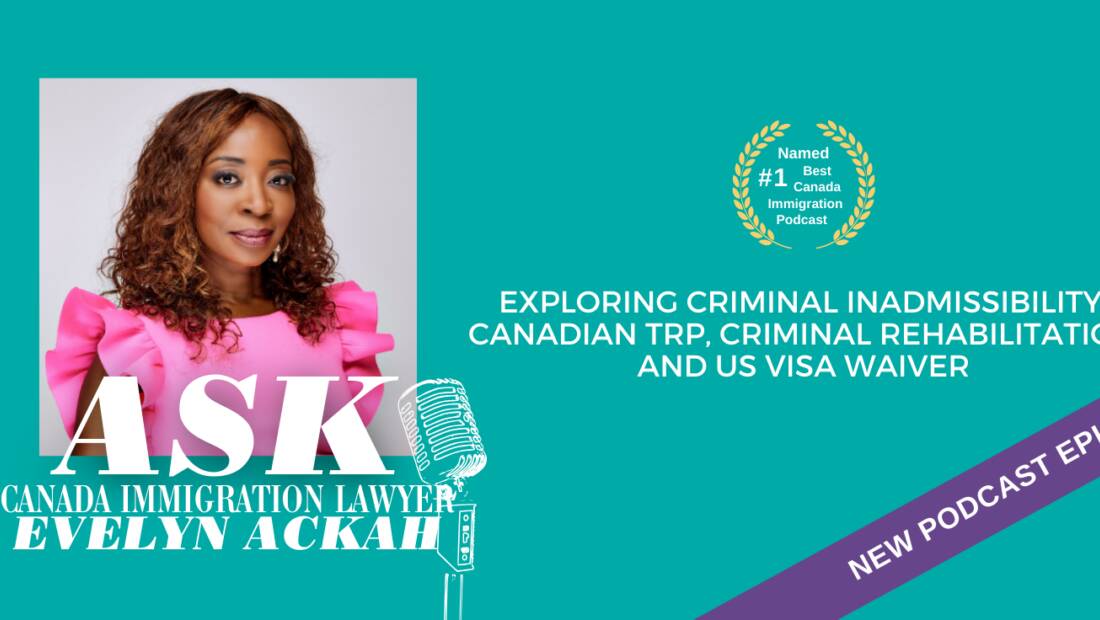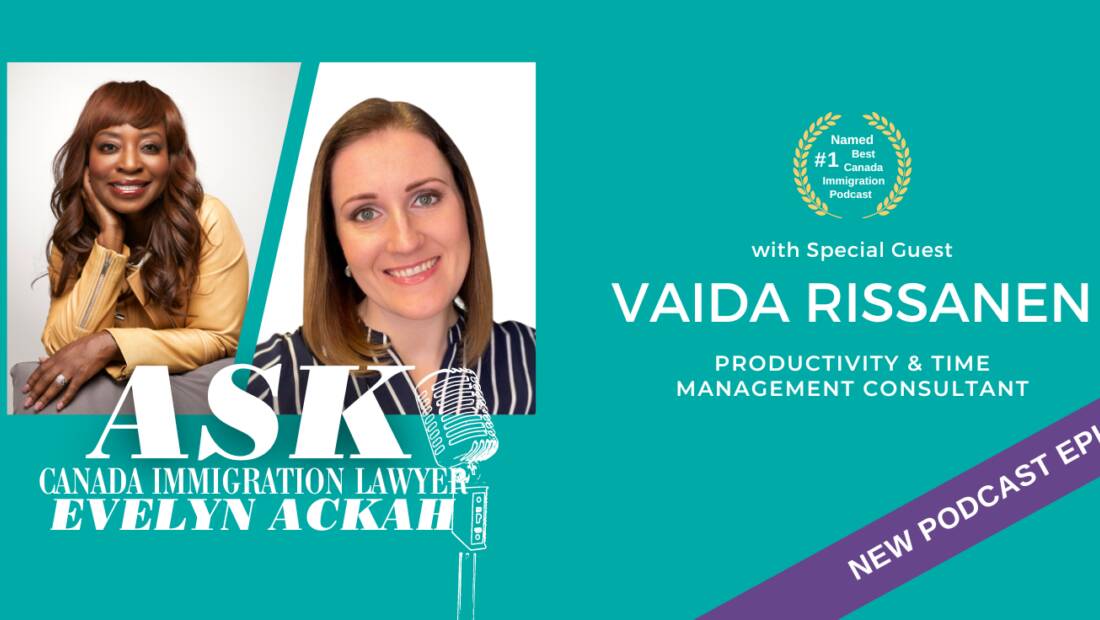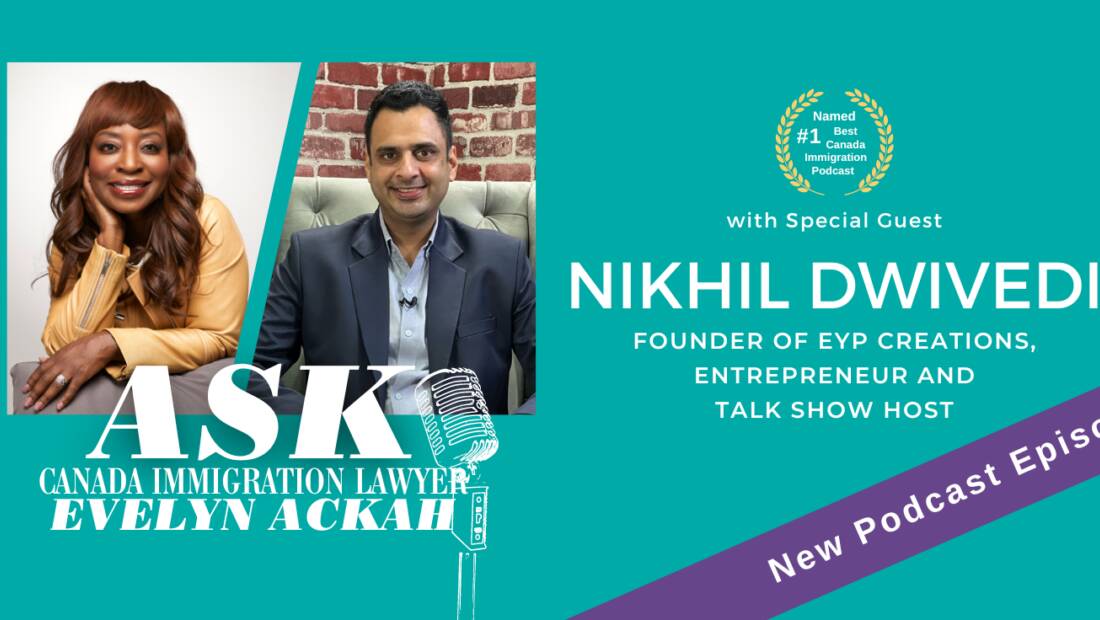Or listen on your favourite podcast app
BOOK YOUR FREE CASE EVALUATION
Calgary immigration lawyer Evelyn Ackah discusses the recent tech layoff in the United States and how this is an opportunity for skilled laid off H-1B workers to move to Canada and for Canadian employers to recruit and hire skilled, experienced tech workers during Canada's labour shortage. Evelyn covers information for H-1B workers who are looking for employment and for Canadian businesses who need to hire skilled workers, including:
- laid off H-1B visa workers have 60 days to find a job before they have to leave the United States
- H-1B workers are skilled, trained and proven employees who have been working for U.S. companies with a similar culture - language, time zones, work culture - to American companies
- with the high number of tech layoffs across many U.S. companies that hire H-1B workers, it may be difficult for these workers to find a new U.S. employer to transfer their H-1B visa within the 60-day period
- Canada's Global Talent Stream allows Canadian employers to streamline and fast-track hiring skilled foreign workers
- Canadian employers who are the brand, subsidiary or head office of the U.S. entity have the option of an Intra Company Transfer to Canada
- H-1B workers may want to move to Canada as a student and enter the local job market while getting an advanced degree under our Study Permits, then apply for Permanent Residence, which would allow a spouse to work in Canada and children to attend Canadian schools
- Canada's Start-Up Visa Program is ideal for highly skilled individuals who may want to join an incubator or launch a new business plan; or move to Canada as a worker for a Start Up first, and then a permanent resident, or come as a permanent resident
- Canadian foreign workers can apply for permanent residence within 3 years, versus the many years wait in the United States
- Many Canadian provinces have high tech Provincial Nominee Programs recruiting foreign workers in high tech industries. Employers could bring H-1B workers to Canada quickly, and get them started working quickly

About Evelyn Ackah
Evelyn Ackah is the Founder and Managing Lawyer at Ackah Business Immigration Law. We work with individuals and business owners from all over the world who want to cross borders seamlessly. For more information on immigration to Canada or the United States, Ask Evelyn Ackah at Ackah Business Immigration Law today at (403) 452‑9515 or email Evelyn directly at contact@ackahlaw.com.
The Ask Canada Immigration Lawyer Evelyn Ackah podcast by Calgary Immigration Lawyer Evelyn Ackah was named #1 Best Canada Immigration Podcast in 2022 by Feedspot.
BOOK YOUR FREE CASE EVALUATION
Transcript:
Good day, this is Evelyn Ackah from the Ask Canada Immigration Lawyer, Evelyn Ackah Podcast. Thank you so much for joining us on our LinkedIn Lives, and lives on all other social media. Today I'm going to be talking about the H-1B Visa and updates, and the challenges right now that US tech workers are having. If you've heard recently in the news, a number of tech workers have been laid off who are in the United States under H-1B visas, and the H-1B visa is the skilled worker visa.
It's the visa for people who maybe have technical skills, lots of education, and they are working in IT, and some kind of technical field such as Meta, and Tesla has them, Microsoft. A number of high tech companies have hired foreign workers through the H-1B Visa program into the United States. Currently, tech firms are set to have sponsored over 45,000 H-1B workers in the past three years, and many are now being laid off, and struggling to stay in the United States unfortunately, as a result of the downturn in the economies.
Post-COVID, it looks like the need for some of them is no longer the same. And so I want to talk about this H-1B Visa program as well as what happens to them because strictly speaking, when you lose your job in the United States and you're on a H-1B visa, you have 60 days to leave the United States. So many of them are scrambling to find employment, and struggling to find opportunities elsewhere so that they can stay in the United States.
So I want to talk about that and talk about also the possibility of can they come to Canada? Is that going to be an option? So I just want to go back a little bit and talk about the H-1B Visa category. This is the program in the states focused on high tech and highly educated people. Usually for the H-1B, there is a limit on the numbers that can come to the United States, and it's basically like a lottery. So they usually have 65,000 workers that are allowed to get the H-1B per year, and it allows them to stay in the United States for up to six years, three years, and then possibly six years.
Although we don't do it directly here in the Canadian office, we do work with US contractors on the US side who help with H-1B visas. And this becomes a lottery where you're essentially trying to bring in the people you want, and usually it'll start again in February of next year, and you hope that you're selected for the lottery. If you're not, then it means you're still waiting, again, for the opportunity to bring in the foreign worker that you really want to bring into the United States.
So once you're lucky enough to get selected for the lottery, then you're able to get the work permits for your employee later in the year. So it'll be October of next year before they're allowed to enter the United States and start working. The challenge is a number of these H-1B visa holders come from countries like China, India, Pakistan, they're highly educated, and they don't fit into a treaty with the United States necessarily. So H-1B may be the only option for them if they're coming in as brand new workers.
So what's been interesting is both Meta, and Twitter, and other companies have been laying off these workers who are essentially tied to them as H-1B visa holders. And their only option is to try to find a new employer in the United States that is willing to port their H-1B to their new entity if it's permitted so they can now work for a new US company under an H-1B For them.
It's not easy, and given the number of layoffs, the sweeping number of tech layoffs, there are going to be tens of thousands of H-1B visa holders in the states that are in critical situations looking to leave the US if they cannot find a new employer as quickly as possible. So, for instance, I understand Twitter employed as many as 700 H-1B workers before the layoffs, and now a number of them are dealing with this. Same with Meta or Facebook, they're also in the critical situation of having to leave the United States if they cannot find employment.
So I want to talk about what happens to them, and also what opportunities are available for employers given this H-1B crisis. If you are an employer in the United States and you are looking for great talent, highly scaled, highly educated talent, you may want to be advertising directly to some of these visa holders that are now in this difficult situation. I know of some business owners that are advertising specifically to say if you are in the US and were one of the laid off employees whether through a visa like at H-1B, or you're an American that was laid off, they are targeting them to try to bring them into their organizations as quickly as possible.
So as long as the company qualifies under the H-1B program to port the employee from one employer to another, they're able to hire them, and bring them into their organizations. And that is incredible because it means they're able to keep highly skilled workers in the United States. So if you are looking for high tech, highly educated employees, you may want to look at advertising directly to these H-1B visa holders because they are in a tough situation, and if they can't find new employers quickly, they may be forced to leave the United States.
One thing I want to talk about is also what happens if you're an H-1B visa holder and you have an organization that may related to the US entity, maybe they're in Canada. You may be able to transfer to the Canadian entity if there's opportunities for you in Canada if you've worked for the US entity for at least one year. And so one of the options would be coming in as an intercompany transfer from your US entity that no longer needs you perhaps to the Canadian entity that may require your expertise, and we can help with that. That's called intercompany transfer, and being able to get your work permit and visa and come to Canada, that would be fabulous for you to be able to do.
Another option is we're looking at what could possibly work for you if you are a tech worker, and you're struggling to figure out your situation. If you've heard anything about immigration in the US right now, you'll know that there are so many H-1B visa holders that are stuck in the green card process. It is taking sometimes 5, 10, 15 years for certain citizens to qualify for a green card that are in the United States as H-1B visa holders.
Sometimes they can be on H-1B for 12 years and still not be a permanent resident of the United States, it's crazy. And it's very much based on the visas available for permanent residents and the country of citizenship. So for Indian citizens and Chinese citizens, it is taking years and years to get your green card. I want to offer some options for you to consider moving to Canada if you're stuck in this situation.
In Canada, we have programs focused on high tech workers under the Global Talent Stream. If you're able to find an employer that wants you, and I recommend for employers in Canada, they should be looking south to recruit as quickly as possible one of these or some of these ideal, highly educated people, and bring them to Canada. One of the options is under the global talent stream, which expedites the labour market impact process. So you could bring your people here quickly.
It could take two weeks, it could take two months, but it's certainly going to be faster than if they go all the way back to their home country and try to come in. If they're in the United States legally, they're going to be processed through the Canadian Consulate in the United States. And that means once you get your LMIA, they can get their work permits and visas, and come to Canada in four to six weeks. So that is the global talent stream, LMIA.
Another option for you to consider if you're a Canadian employer is are you the Canadian, brand, subsidiary, or head office of the US entity? And as I mentioned before, if you are, you have the option of doing Intra Company Transfer to Canada so they can join the Canadian entity if you have a need for them.
And that would be also another option that is fast that would be processed again through the Canadian Consulate in the United States. So long as the foreign worker that has the H-1B has been with the company for at least 12 months, they would qualify under the intercompany transfer stream so we really recommend you consider this. If you're an employer and you're looking for great talent, as I know we are in Canada, look south and see what options are available.
For those of you on the H-1B in the states and you're looking at ways to come to Canada, you may want to consider as well moving to Canada as a student. I know you're already highly, highly educated, but this might be the fastest way for you to leave the US so that you don't overstay, get into school in Canada, and your spouse is going to be able to work full-time and within 12 months of full-time work, you can apply for permanent residents. And it's much faster in Canada than it is in the United States.
It could be a matter of becoming a permanent resident within three years of arrival. So in Canada, we don't make you wait 10 years, 15 years to become a permanent resident. We want to keep our highly skilled workers. So I want you to consider is school an option? Even if it's an 18-month program, your spouse can work, your children can come to school here, and you can get out of the United States quickly and start a new life in Canada.
Another option for you to consider if you have the means financially is the Startup Visa program. The Start-Up Visa Program is a program where given your backgrounds, you're already highly educated, you may want to join an incubator, or come up with a business plan, and the startup visa allows you to move to Canada as either a worker first, and then a permanent resident, or come as a permanent resident. The investment is high to do a Start-Up Visa Program, but this way you'll be working for yourself, and you're no longer at the mercy of an employer in the United States or in Canada. You'll be your own boss and you'll be able to start up a business based on your high tech knowledge and education.
So these are some ideas for you to consider if you're looking to move to Canada, or if you're looking to recruit some of these highly skilled H-1B visa holders. Advertise targeting them specifically. H-1B visa holder if you've been laid off, we're interested in your skill set. We want to consider bringing you to Canada. Start advertising to target the thousands of people that have been laid off. And honestly, they're probably frustrated by waiting so many years in the United States. There are a lot of people that are looking for jobs and if you target them, you could be able to bring them to Canada under the various streams I've discussed.
Again, one of them is intercompany transfer, the other one would be the global talent stream high tech category as well. Many provinces, including BC have high tech Provincial Nominee Programs aimed at the high tech industry. You could bring them to Canada quickly, and get them started working for you quickly. With the help of a professional, we can help you with this process. And the other one, of course is the Start-Up Visa Program.
If you'd like to learn more about any of these options to bring an H-1B Visa holder to Canada, and to recruit in the United States for H-1B Visa holders, please contact us at Ackah Law. We'd love to help you. Our number is below. As well you can contact us online at ackahlaw.com.
Thank you so much for joining us on the Ask Canada Immigration Lawyer Podcast and on all our social media. Give us a call, we can help you flesh out a strategy sooner than later so you can take advantage of the opportunities that are available to you now to hire incredible talent. Thanks so much for joining. Take good care. Bye-bye.

